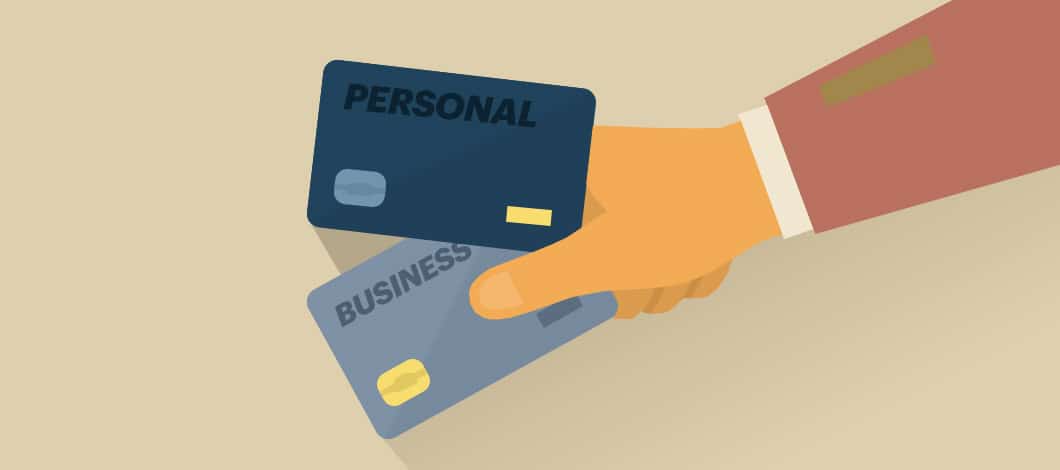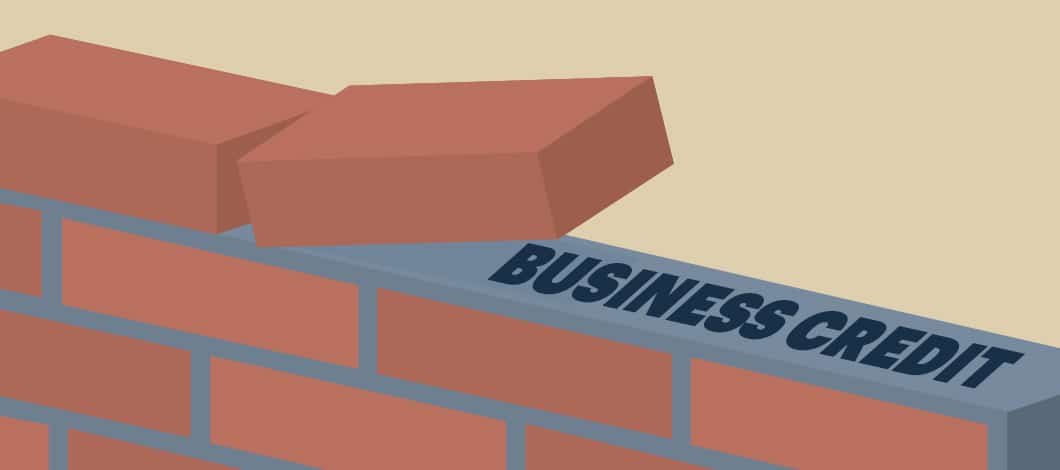The relationship between business credit vs. personal credit affects your credit score, bookkeeping and taxes.
Learn how they interact. We’ll cover what business and personal credit are, how they differ and how they interact. Also, we’ll share some tips on how you can build your business credit and what you can do to improve your business credit rating if you have a bad personal credit score.
What Is Business Credit vs. Personal Credit?
Your personal credit score is a rating lenders use to measure your ability to repay a loan, while a business credit score is a similar rating used to measure a company’s ability to repay debt.
Both personal and business credit scores are measured on a numerical scale, with a higher number indicating a greater ability to repay debt, thus representing lesser risk to lenders. The greater your score, the more willing lenders are to offer you loans, lines of credit or credit cards.
Your personal credit score is keyed to your Social Security number (SSN), while a business credit score is keyed to a company’s employer identification number (EIN).
Personal Credit Scoring Systems
The numerical range and interpretation of personal and business credit scores varies depending on which scoring system is being used and which company is interpreting the data. In the U.S., the most popular personal credit scoring system is FICO, named after the data analytics company which provides it. FICO scores factor in 5 major categories of data with different weights:
- History of paying bills on time (35% of total score)
- Amount owed compared to available credit limit (30%)
- Length of credit history (15%)
- Recent applications for new credit (10%)
- Mix of types of credit, such as installment loans, mortgage loans and credit cards (10%)
FICO data is collected and scored by 3 major credit-rating companies: Equifax, Experian and TransUnion. Each company uses its own model to analyze data, but in general, according to Equifax, the scoring range is 300 to 850, with scores interpreted as follows:
- 580 to 669: fair credit
- 670 to 739: good credit
- 740 to 799: very good credit
- 800 and up: excellent credit
Lenders view borrowers with scores of 670 and up as lower risks. Those between 580 and 669 may have difficulty qualifying for the best rates. Those below 580 may have difficulty qualifying for credit at all or will qualify for high rates and low limits.
Business Credit Scoring Systems
In addition to its consumer credit scoring service, FICO offers a Small Business Scoring System (SBSS). The FICO SBSS system factors in both personal and business data, including:
- Personal credit scores and financial data of company principals
- Company credit history and financial data, such as financial statements, bank records and history of paying vendors on time
The SBSS uses a scale of 0 to 300. It pulls in data from 3 other firms which track business credit data: Equifax, Experian and Dun & Bradstreet. These firms consider the same types of factors as the FICO SBSS system, but use scoring systems that range from 0 to 100 and place emphasis on different items.
Equifax and Experian focus on providing data to lenders evaluating borrowers, while Dun & Bradstreet serves the needs of vendors and suppliers seeking to evaluate companies’ creditworthiness.

How Does Personal Credit Affect Business Credit?
Because business credit scoring systems factor in personal financial data from a company’s principals, your personal credit can impact your business credit score. However, how much it affects your business credit can vary.
Personal financial data is only one factor that can affect business credit scores. Your personal credit score may be offset by other variables, such as your company’s monthly revenue, how many years your company has been in business and your company’s history of paying vendors on time.
Your personal credit score has more impact if you’re a sole proprietor. If you have partners or you’re a corporation, the credit of other principals of your company come into play and may dilute the impact of your personal credit.
Your personal credit will weigh more heavily on your business credit under certain conditions, which can include:
- Your company is a startup without an established credit history
- You’re a sole proprietor without any partners to balance out your personal credit
- You have a very low personal credit score, causing lenders greater concern about your debt-repayment habits
- You’re applying with a lender which factors in personal credit
Under one or more of these conditions, your personal credit score may influence your ability to qualify for credit as well as the amounts and rates you qualify for.
If you’re applying for a business loan, Here’s one way to tell how much your personal credit will affect your application. See whether your application only asks for your EIN or your SSN. If your application only requests an EIN, your personal credit is less likely to weigh in. However, if your application requests an SSN, expect your personal credit score to be checked.
Does Business Credit Affect Personal Credit?
In general, business credit rarely affects personal credit scores or opportunities, according to Dun & Bradstreet. This is partly because a business is legally a separate entity from an individual. However, the more closely you are identified with your business, the more likely your business credit is to affect your personal credit.
This may apply if, for example, you:
- Use the same bank accounts and credit cards for your personal finances and business finances
- Tap your personal credit to cover your company’s debts
- Don’t track your personal and business finances separately in your bookkeeping
- Don’t file taxes separately for your individual tax return and your business tax return
- Are applying for a business loan that requires personal assets as collateral
- Fail to repay a business loan guaranteed by personal assets
On the other hand, the less entangled your business finances are with your personal finances, the less your business credit will tend to affect your personal credit. You can distance your business and personal credit by taking steps such as:
- Incorporating
- Using separate business bank accounts and credit cards
- Keeping separate books
- Filing taxes separately

How to Build Business Credit Separate From Personal Credit
The steps you take to improve your personal credit score, such as paying bills on time, can indirectly help your business credit score. Additionally, you can take specific steps to build your business credit score.
These include:
- Formally creating a business entity and applying for an EIN
- Creating a separate bank account for your business
- Applying for business credit cards and loans
- Using your business bank account and credit card to pay for business expenses, avoiding use of personal financial accounts for business purposes
- Registering your business with credit reporting companies that track business credit, such as applying for a Dun & Bradstreet identifying number, known as a D-U-N-S Number
- Paying vendors, suppliers and manufacturers on time and asking them to submit their experiences with you to business credit reporting companies
- Checking your business credit report regularly and reporting any errors or outdated information which needs to be corrected
Taking these steps will help your company build a credit history separate from your personal credit history.
Establishing Business Credit with Bad Personal Credit
If you have bad personal credit, you can take several steps to mitigate the impact on your business credit.
These include:
- Choosing a business structure that formally separates yourself from your business, such as a corporation that enables you to bring in other shareholders
- Paying business bills with a company credit card that isn’t linked to your personal credit file (this varies by card, so check when applying for cards)
- Paying company bills on time, even if you’ve had a history of late payments on personal bills
In addition to these steps, working to improve your personal credit can help you move toward a better business credit rating. Strive to pay bills on time. Keep balances low. Establish a history of managing different types of credit, including installment loans.
Build Your Business Credit to Strengthen Your Company’s Financing
Financial providers use personal credit scores to measure your ability to repay personal loans. Note that Business credit scores perform a similar function for lenders, vendors and suppliers. They want to check your ability to pay business debts.
Personal credit scoring systems emphasize factors such as your history of paying bills on time and the amount you owe compared with your available credit limit. Business credit scoring systems may consider your personal finances, but also factor in your company’s finances as well as the finances of other principals in your business.
This means that personal credit can affect business credit, but its impact may be offset by factors such as:
- Your company’s revenue
- How long you’ve been in business
- Your company’s history of paying vendors
On the other hand, business credit tends to have less effect on personal credit. That is unless your personal finances are intertwined with your business finances.
You can strengthen your business credit by taking steps such as:
- Applying for a business EIN
- Using separate business bank accounts and credit cards
- Paying vendors on time
Applying for loans in your company’s name also can help you build a business credit history. If you’re looking for loans or other types of business financing, take a few minutes to fill out our free, no-obligation prequalifying application and find out which financing options may be available to you.










